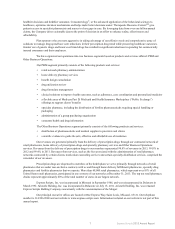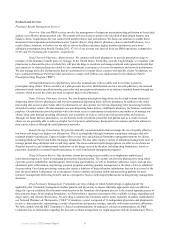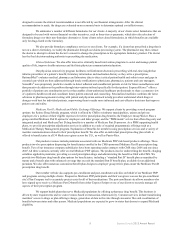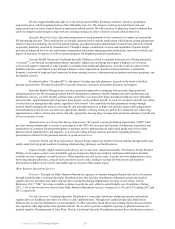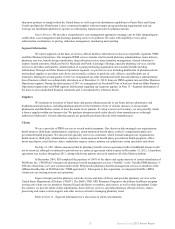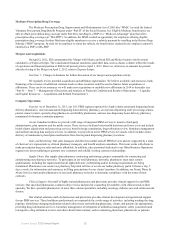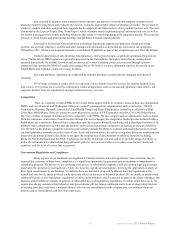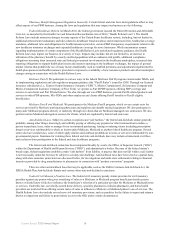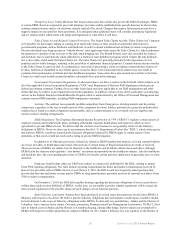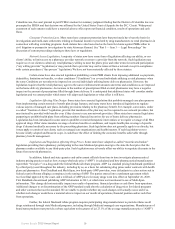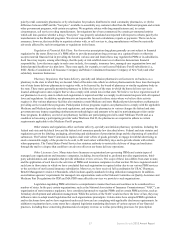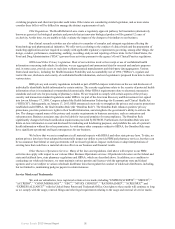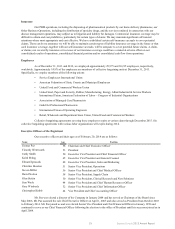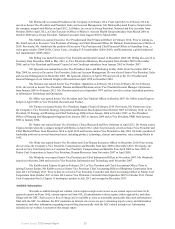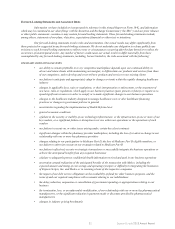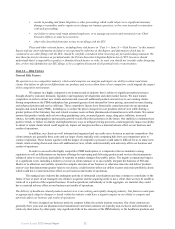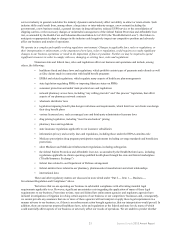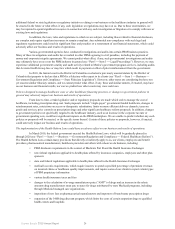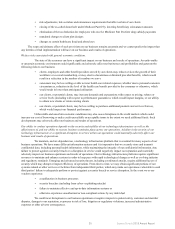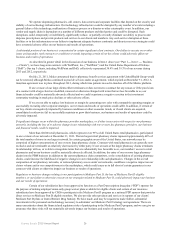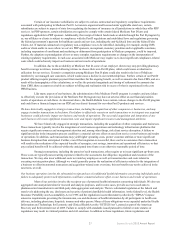Express Scripts 2013 Annual Report Download - page 17
Download and view the complete annual report
Please find page 17 of the 2013 Express Scripts annual report below. You can navigate through the pages in the report by either clicking on the pages listed below, or by using the keyword search tool below to find specific information within the annual report.
17 Express Scripts 2013 Annual Report
paid by retail community pharmacies or by wholesalers for products distributed to retail community pharmacies, or (b) the
difference between AMP and the “best price” available to essentially any customer other than the Medicaid program and certain
other government programs, with certain exceptions. We negotiate rebates with drug manufacturers and, in certain
circumstances, sell services to drug manufacturers. Investigations have been commenced by certain governmental entities
which call into question whether a drug’s “best price” was properly calculated and reported with respect to rebates paid by the
manufacturers to the Medicaid programs. We are not responsible for such calculations, reports or payments. There can be no
assurance, however, that our ability to negotiate rebates with, or sell services to, drug manufacturers will not be materially
adversely affected by such investigations or regulations in the future.
Regulation of Financial Risk Plans. Fee-for-service prescription drug plans generally are not subject to financial
regulation by the states. However, if a PBM offers to provide prescription drug coverage on a capitated basis or otherwise
accepts material financial risk in providing the benefit, various state and federal laws may regulate the PBM or its subsidiaries.
Such laws may require, among other things, that the party at risk establish reserves or otherwise demonstrate financial
responsibility. Laws that may apply in such cases include, for example, insurance laws, managed care organization laws and
limited prepaid health service plan laws. These may apply, for example, to our licensed Medicare Part D subsidiaries (i.e.,
ESIC, Medco Containment Life Insurance Company and Medco Containment Insurance Company of New York) and other
subsidiary insurance businesses.
Pharmacy Regulation. Our home delivery, specialty and infusion pharmacies are licensed to do business as a
pharmacy in the state in which they are located. Most of the states into which we deliver pharmaceuticals have laws that require
out-of-state home delivery pharmacies to register with, or be licensed by, the board of pharmacy or similar regulatory body in
the state. These states generally permit the pharmacy to follow the laws of the state in which the home delivery service is
located, although some states require that we also comply with certain laws in that state. We believe we have registered each of
our pharmacies in every state in which such registration is required and that we comply in all material respects with all required
laws and regulations. In addition, our pharmacists and nurses are licensed in those states where we believe their activity
requires it. Our various pharmacy facilities also maintain certain Medicare and state Medicaid provider numbers as pharmacies
providing services under these programs. Participation in these programs requires our pharmacies to comply with the applicable
Medicare and Medicaid provider rules and regulations, and exposes the pharmacies to various changes the federal and state
governments may impose regarding reimbursement methodologies and amounts to be paid to participating providers under
these programs. In addition, several of our pharmacy facilities are participating providers under Medicare Part D and, as a
condition to becoming a participating provider under Medicare Part D, the pharmacies are required to adhere to certain
requirements applicable to the Medicare Part D program.
Other statutes and regulations affect our home delivery, specialty and infusion pharmacy operations, including the
federal and state anti-kickback laws and the federal civil monetary penalty law described above. Federal and state statutes and
regulations govern the labeling, packaging, advertising and adulteration of prescription drugs and the dispensing of controlled
substances. The Federal Trade Commission requires mail order sellers of goods generally to engage in truthful advertising, to
stock a reasonable supply of the product to be sold, to fill mail orders within thirty days and to provide clients with refunds
when appropriate. The United States Postal Service has statutory authority to restrict the delivery of drugs and medicines
through the mail to a degree that could have an adverse effect on our home delivery operations.
Other Licensure Laws. Many states have licensure or registration laws governing PBMs and certain types of
managed care organizations and insurance companies, including, but not limited to, preferred provider organizations, third-
party administrators and companies that provide utilization review services. The scope of these laws differs from state to state,
and the application of such laws to the activities of PBMs and insurance companies is often unclear. We have registered under
such laws in those states in which we have concluded that such registration is required either due to our various PBM services
or the activities of our licensed insurance subsidiaries. Moreover, we have received full accreditation for URAC Pharmacy
Benefit Management version 2.0 Standards, which includes quality standards for drug utilization management. In addition,
accreditation agencies’ requirements for managed care organizations such as the National Committee on Quality Assurance and
Medicare Part D regulations for PDP and MA-PDPs may affect the services we provide to such organizations.
Legislation regulating PBM activities in a comprehensive manner has been and continues to be considered in a
number of states. In the past, certain organizations, such as the National Association of Insurance Commissioners (“NAIC”), an
organization of state insurance regulators, have considered proposals to regulate PBMs and/or certain PBM activities, such as
formulary development and utilization management. While the actions of the NAIC would not have the force of law, they may
influence states to adopt model legislation that such organizations promulgate. Certain states have adopted PBM registration
and/or disclosure laws and we have registered under such laws and are complying with applicable disclosure requirements. In
addition to registration laws, some states have adopted legislation mandating disclosure of various aspects of our financial
practices, including those concerning pharmaceutical company revenue, as well as prescribing processes for prescription


